| Srl | Item |
| 1 |
ID:
071695


|
|
|
| 2 |
ID:
162450
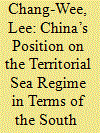

|
|
|
|
|
| Summary/Abstract |
China has a long coastline of approximately 18,000 kilometers and hence an
extensive continental shelf as well as an EEZ. Its coastline is said to be the tenth
longest coastline in the world. The total sea area in the China Seas is about 4.7
million square kilometers. Despite these advantageous circumstances in geography,
China failed to become a maritime power like Spain, Portugal, the Netherlands and
the UK. So it remained a land power for a long time except when Zheng He, the
great seafarer in Chinese history, led the greatest ocean-going fleets of the world of
that time, sailing to the Pacific and Indian Oceans during the years of 1405–1433.
As a result, China suffered foreign invasions several times from the sea, being
defeated in the Opium War as well as at the Sino–Japanese War in the nineteenth
century
|
|
|
|
|
|
|
|
|
|
|
|
|
|
|
|
| 3 |
ID:
171144


|
|
|
|
|
| Summary/Abstract |
The doctrine of constructive presence allows a coastal state to pursue and arrest a vessel on the high seas, even though that vessel may have never entered the state’s jurisdiction. This is because the vessel’s presence can be “constructed” inside the state’s jurisdiction when a connection can be found with other craft, suspected of having committed an illegal act there. This article explores the impact of the Tribunal’s decision in the Arctic Sunrise case (2015) on constructive presence. It shows that the necessary link between the vessels is now found when there exists evidence of participation in an illegal scheme.
|
|
|
|
|
|
|
|
|
|
|
|
|
|
|
|
| 4 |
ID:
188220
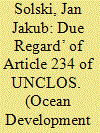

|
|
|
|
|
| Summary/Abstract |
Article 234 of UNCLOS is in many ways exceptional, but it is not unique in the sense that it grants to the coastal state “complete” legislative power. Arguably, “complete” coastal state jurisdiction exists in the territorial sea for the purposes enumerated in Article 21(1), allowing coastal states to adopt ship reporting systems, pilotage, and other routing measures unilaterally. The analysis of state practice reveals that states often decide to engage the International Maritime Organization (IMO) in different ways, even when such a course of action is not mandatory. This article advocates for meaningful deliberation as both a suitable method of meeting Article 234’s due regard standard, and a practice that can be expected from a steward.
|
|
|
|
|
|
|
|
|
|
|
|
|
|
|
|
| 5 |
ID:
167516
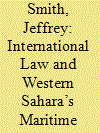

|
|
|
|
|
| Summary/Abstract |
Western Sahara’s coastal waters have become contentious because of seabed petroleum exploration and fisheries undertaken pursuant to treaties between Morocco and the European Union, Japan, and Russia. These activities have been protested by the territory’s government-in-exile, the Saharawi Arab Democratic Republic. In 2017 Morocco announced its intention to adopt legislation to create an exclusive economic zone (EEZ) on the territory’s coast. This article considers the status of Saharan coastal waters in the circumstances of decolonization and occupation. The obligations on states interested in exploring and extracting Saharan ocean resources are considered and are argued to be restrictive regardless of the status of the territory’s coastal waters and recognition of a Saharawi state.
|
|
|
|
|
|
|
|
|
|
|
|
|
|
|
|
| 6 |
ID:
109095
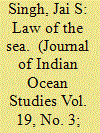

|
|
|
| 7 |
ID:
152768
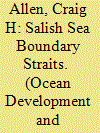

|
|
|
|
|
| Summary/Abstract |
The legal classification of the boundary straits of the Salish Sea between the western United States and Canada as either historic internal waters or territorial seas, subject to a right of innocent or transit passage, has been the subject of periodic debate within the U.S. government since the United States and Great Britain entered into the 1846 Oregon Treaty. As neither state has made an express public claim of historic title to the waters, any evidence for such a claim must be sought in less explicit and sometimes conflicting sources. This article applies the United States' legal test for a historic waters claim, recently set out in the U.S. Department of State's analysis of China's claims in the South China Sea, and concludes that the boundary waters of the Salish Sea would not meet that test. Accordingly, the waters of the Salish Sea boundary straits on the United States' side of the international boundary must be considered a territorial sea.
|
|
|
|
|
|
|
|
|
|
|
|
|
|
|
|
| 8 |
ID:
128285


|
|
|
|
|
| Publication |
2014.
|
| Summary/Abstract |
Heightened attention is being paid to the Northwest Passage, the waters that flow among the islands of northern Canada and that, in the next decades, may be amenable to commercial navigation. Most debates regarding the Passage's legal status focus on Canada's contention that it is its internal waters and the United States' contention that it is an international strait. This article proposes that a designation of the Passage as Canada's territorial sea would be as legally robust as the internal waters or international strait designations while satisfying both Canada's and the United States' political objectives.
|
|
|
|
|
|
|
|
|
|
|
|
|
|
|
|
| 9 |
ID:
120894
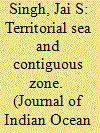

|
|
|